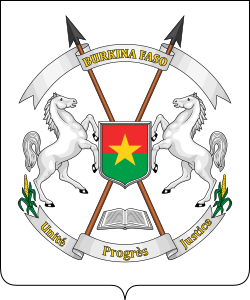 |
|---|
The Minister of Foreign Affairs of the Republic of Burkina Faso (previously known as the Republic of Upper Volta ) is a government minister in charge of the Ministry of Foreign Affairs of Burkina Faso, responsible for conducting foreign relations of the country.
The following is a list of foreign ministers of Upper Volta/Burkina Faso since its founding in 1960:
| No. | Name (Birth–Death) | Portrait | Tenure |
|---|---|---|---|
| Republic of Upper Volta (1960–1984) | |||
| 1 | Maurice Yaméogo (1921–1993) |  | 1960 |
| 2 | Lompolo Koné (1921–1974) |  | 1960–1966 |
| 3 | Sangoulé Lamizana (1916–2005) |  | 1966–1967 |
| 4 | Malick Zoromé (1935–2012) |  | 1967–1971 |
| 5 | Joseph Conombo (1917–2008) |  | 1971–1974 |
| 6 | Saye Zerbo (1932–2013) |  | 1974–1976 |
| 7 | Alfred Kabore (b. 1939) |  | 1976–1977 |
| 8 | Moussa Kargougou (1926–1997) |  | 1977–1980 |
| 9 | Félix Tientarboum (1935–2013) |  | 1980–1982 |
| 10 | Michel Kafando (b. 1942) |  | 1982–1983 |
| 11 | Hama Arba Diallo (1939–2014) |  | 1983–1984 |
| Republic of Burkina Faso (1984–present) | |||
| 12 | Basile Guissou (b. 1949) |  | 1984–1986 |
| 13 | Léandre Bassolé (b. 1946) |  | 1986–1987 |
| 14 | Jean-Marc Palm |  | 1987–1989 |
| 15 | Issou Go |  | 1989 |
| 16 | Prosper Vokouma (b. 1955) |  | 1989–1991 |
| 17 | Issa Dominique Konaté (b. 1953) |  | 1991–1992 |
| 18 | Thomas Sanon (b. 1947) |  | 1992–1994 |
| 19 | Ablassé Ouedraogo (b. 1953) |  | 1994–1999 |
| 20 | Youssouf Ouédraogo (1952–2017) |  | 1999–2007 |
| 21 | Djibril Bassolé (b. 1957) |  | 2007–2008 |
| 22 | Alain Bédouma Yoda (b. 1951) |  | 2008–2011 |
| (21) | Djibril Bassolé (b. 1957) |  | 2011–2014 |
| (10) | Michel Kafando (b. 1942) |  | 2014–2015 |
| 23 | Moussa Nébié (b. 1959) |  | 2015 |
| (23) | 2015–2016 | ||
| 24 | Alpha Barry (b. 1970) |  | 2016–2020 |
| (24) | 2021 | ||
| 25 | Rosine Sori-Coulibaly (b. 1958) |  | 2021–2022 |
| 26 | Olivia Rouamba |  | 2022–2023 |
| 27 | Karamoko Jean-Marie Traoré (b. 1972) |  | 2023–present |